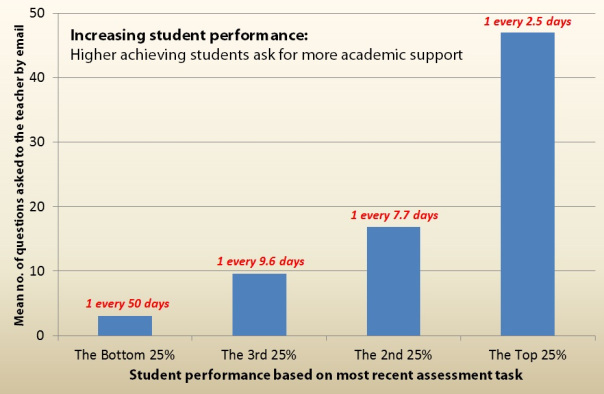Studying can feel like a solitary activity – looking back at my student days, I remember sitting alone at a desk with just my textbooks, highlighters, cans of Coke and expanding self-doubt. If I didn’t understand a concept, or couldn’t find an answer, I’d search deeper into the pages, desperately, thinking maybe there was a clue I had missed. If it still seemed hopeless I’d sleep, rationalising that perhaps somehow the revelation would appear in my dreams. (It usually did not.)
Photo: simpleinsomnia
Science says there’s a more effective tactic that students don’t turn to enough, and that is to ask for help. (Rats, I was hoping it would be to buy more highlighters.)
A Wall Street Journal piece highlights a 2016 study by Saint Louis University researchers that looked at 414 university students in introductory science classes. Those who asked their instructors for help during office hours were more likely to get A’s, but fewer than one in five students did so. It isn’t that the office hours necessarily held the key to good scores, but what mattered was that those students took on what the WSJ calls an “activist approach”. That meant they held themselves accountable for reaching their goals, so if they ever didn’t understand something, they would ask teachers or classmates, or seek out other resources for guidance.
[referenced url=”https://www.lifehacker.com.au/2015/02/study-less-study-smart-the-best-ways-to-retain-more-in-less-time/” thumb=”https://img.youtube.com/vi/IlU-zDU6aQ0/0.jpg” title=”Study Less, Study Smart: The Best Ways To Retain More In Less Time” excerpt=”When you’re learning new material, it can be overwhelming when you think about how much time you need to truly understand it all. This studying technique can help you stay focused and take on more information with shorter study sessions.”]
Professors expect students to have mastered this skill before they enter university, yet so many have not. Culture and gender may be factors (men tend to be less likely to ask for help), as well as fears of “bothering” a busy teacher or being seen as unprepared. One study by a University of Michigan psychologist found that as children got older, they became less likely to ask their classmates for help in understanding concepts, and more likely to just want to copy their homework. But asking for help can maximise learning, experts say. Simply reading and rereading material doesn’t lock it into memory.
Chemistry teacher James Kennedy even charted his observations from his own classroom.

James Kennedy
Kennedy writes:
I searched my inbox for the surname of every student I teach then counted the hundreds of questions they have asked me collectively since the start of the academic year. I grouped the students into quartiles and plotted the average number of questions asked in the last few months versus their current academic performance.
Results were shocking: not only did the higher-achieving students ask me more questions by email than the lower-achieving students, but the correlation was surprisingly strong (R² = 71%). This begs the question: do high achieving students get higher grades because they ask for more help? Is there a causal link between getting more help from a teacher and achieving a higher grade? Common sense suggests that there is.
Being able to confidently ask for help with schoolwork is something that takes practise. Here are some tips for students on how to reach out to others for greater achievement:
- Use the Five-Minute Rule. Kennedy writes that you should ask for help from your teacher or tutor if you’ve been stuck on a question for more than five minutes, and have made zero progress.
- Find or form a study partner or group. A 2015 study found that students who gathered in groups and quizzed each other weekly achieved higher grades than those who used other study techniques.
- If you’re nervous about asking your teacher for help in person, email them. Remember to be specific in your request, and know that by asking, you’re showing that you want to do your best.
Get out those calculators and sharpen your 2B pencils – it’s Back-to-School Week! Going far beyond the classroom, Lifehacker is bringing you genius tricks and ideas on how to start routines, brush up on old skills, or learn something new this year.

Comments